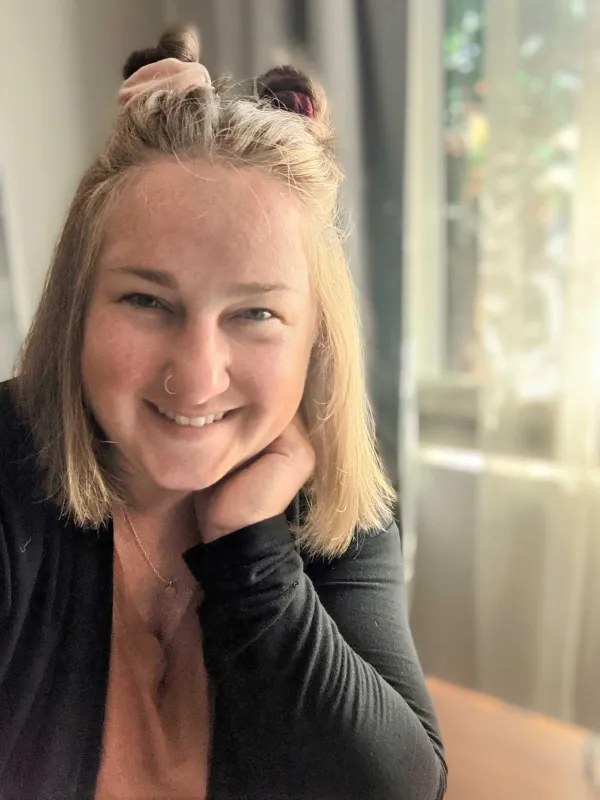How WFSE Members at DCYF Won Back Pay & Built Team Awesome

When eight WFSE members at Department of Children, Youth and Families (DCYF) realized they were being asked to do work beyond their job class without a pay increase, they joined forces to make things right.
They organized to win back pay—and planted seeds for a stronger union in their workplace.
[caption caption="Bethany Plunkett" align="left"]
Bethany Plunkett, a WFSE member and steward, is a social service specialist 3 (SSS3) at DCYF. She connects families with public services and works to keep kids safe.
“It’s lots of conversations with families about their life and what’s going well, what they’re struggling with, and what we can do to help,” she said.
For Plunkett, public service and union membership are ways to have a positive impact in others’ lives.
When she was approached by an administrator and asked to help mentor new coworkers, Plunkett said yes, but something didn’t sit right.
Plunkett had been asked to fulfill the functions of a social service specialist 4, or SSS4, without increasing her salary to the appropriate level.
DCYF employees successfully advocated for the creation of the SSS4 role several years ago to designate positions for training and mentoring new staff.
“When you are trying to go out with new workers all the time on top of your caseload, it can be really overwhelming,” said Jeanette Obelcz, a DCYF supervisor, member of the new WFSE Local 889, and MAT mentor.
In practice, the SSS4 hadn’t been implemented. Because it was assigned a higher salary, hiring SSS4s would mean less budget available for roles that carry a full caseload.
“We think the positions are super valuable and they still aren’t being used,” said Plunkett.
Plunkett shared her story of being asked to work outside her job classification at a WFSE Social Services Policy Committee meeting.
Within a few weeks, WFSE members in seven other units had received similar instructions to work as SSS4s without pay increases.
Tabitha Culp was among those asked to take on training and other duties without an official promotion or pay increase.
[caption caption="Tabitha Culp" align="right"]
“I was approached by a supervisor with this lead situation. He told me, ‘It’s like the 4 position but you don’t get paid for it because we don’t have the budget.’”
Plunkett, Culp and their coworkers met with their administrator. He denied that these improper requests had ever been made.
“I think if the administrator had apologized, we probably would have dropped it, but instead he said we all made it up. That solidified the drive to fight for this,” Culp recalled.
“We encouraged each other that this was something we could address and we had every right to do it,” said Plunkett.
“We weren’t doing anything wrong by asking for this compensation. We were successful because we banded together.”
Moving out of isolation and working together was key to their success.
“It was the fact that there was a collective,” Culp said.
“It’s scary, going up against the boss or the big boss by yourself. For me, and I know for others, having that collective group gave me the confidence to be able to go through with it.”
Filing for reallocation wasn’t their only strategy to build a more powerful union.
DCYF members and union staff utilized UMCC meetings to elevate concerns to DCYF leadership and continued to convene at Social Services Policy Committee meetings.
Building power took time.
Eventually, all the members who participated in the job action were awarded back pay—and official hiring for SSS4 positions has begun.
“From this whole process, quite a few of the workers stuck around and got involved and started taking on more leadership,” Obelcz said.
DCYF MAT members now meet biweekly. Their work has earned them the nickname “Team Awesome” from their union mentors and supporters.
They’re helping to tackle new employee orientations (NEOs) and make sure their union has a role in the onboarding process.
“This is how we make change,” Plunkett said.
“If you’re not a union member, you don’t have the same influence to affect change and make things better. It’s super important to get involved, because we are the union.”
Culp says union power comes from engaged members.
“Sometimes folks think the union works for us, but the union doesn’t exist without members.”
“The more people that are invested and engaged in the union, the more power we have to get what we want and need. That’s how we got our raises, and that’s how we got Juneteenth and our lump sums,” Culp said.
“It doesn’t work if we don’t have people.”
Want to build your own Team Awesome? Let’s connect about starting a member action team.
